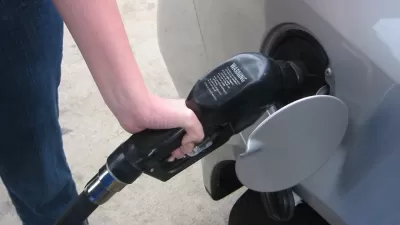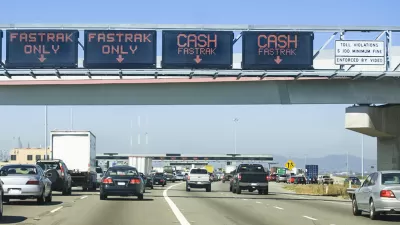Ryan Holeywell writes a follow-up to the meeting of a House Transportation subcommittee on the impending insolvency of the Highway Trust Fund - looking at it from the states' perspective rather than from Capitol Hill's. They have a lot at stake.
While some of the newer House members did not appear stirred by the dire consequences of the impending insolvency of the Highway Trust Fund as explained by Department of Transportation (DOT) under secretary Polly Trottenberg and Congressional Budget Office unit chief Kim Cawley on July 23, "it’s state transportation officials who should be worried", writes Holeywell.
If the trust fund experiences a cash shortfall, the DOT will be forced to start taking steps to manage whatever cash it has left. Trottenberg gave Congress a detailed look at what exactly that might mean for states -- and the situation isn't pretty.
Holeywell writes how the DOT pays for state projects when using federal funding. Rather than fronting them them the money, the "state departments of transportation enter agreements with the Federal Highway Administration (FHWA), award contracts to construction companies and then rely on getting payments from the feds in order to make payments to the contractors."
But if the trust fund gets too depleted, states will start getting reimbursed less and less frequently, perhaps as rarely as twice a month, Trottenberg warned. Even worse for states: If the situation gets bad enough, the feds might only be able to cover a portion of states’ reimbursement requests. If that happens, states could be forced to pull back on some projects.
How this impending repayment uncertainty to states will play out on Capitol Hill is yet to be seen. Two of the three options listed in Transportation Insolvency 101 for fixing the problem - raising the gas tax or transferring funds from the General Fund, would avert the problem altogether. While Congress is not known for planning in advance to avert financial crises, pressure from the states that legislators represent could be helpful to nudge them to act sooner than later.
FULL STORY: What a Depleted Highway Trust Fund Means for States

Manufactured Crisis: Losing the Nation’s Largest Source of Unsubsidized Affordable Housing
Manufactured housing communities have long been an affordable housing option for millions of people living in the U.S., but that affordability is disappearing rapidly. How did we get here?

Americans May Be Stuck — But Why?
Americans are moving a lot less than they once did, and that is a problem. While Yoni Applebaum, in his highly-publicized article Stuck, gets the reasons badly wrong, it's still important to ask: why are we moving so much less than before?

Research Shows More Roads = More Driving
A national study shows, once again, that increasing road supply induces additional vehicle travel, particularly over the long run.

Judge Halts Enforcement of Anti-Homeless Laws in Grants Pass
The Oregon city will be barred from enforcing two ordinances that prosecute unhoused residents until it increases capacity and accessibility at designated camping sites.

Advancing Sustainability in Los Angeles County Schools
The Los Angeles County Office of Education’s Green Schools Symposium brings together educators, students, and experts to advance sustainability in schools through innovative design, climate resilience strategies, and collaborative learning.

Using Old Oil and Gas Wells for Green Energy Storage
Penn State researchers have found that repurposing abandoned oil and gas wells for geothermal-assisted compressed-air energy storage can boost efficiency, reduce environmental risks, and support clean energy and job transitions.
Urban Design for Planners 1: Software Tools
This six-course series explores essential urban design concepts using open source software and equips planners with the tools they need to participate fully in the urban design process.
Planning for Universal Design
Learn the tools for implementing Universal Design in planning regulations.
City of Moreno Valley
Institute for Housing and Urban Development Studies (IHS)
City of Grandview
Harvard GSD Executive Education
NYU Wagner Graduate School of Public Service
City of Cambridge, Maryland
Newport County Development Council: Connect Greater Newport





























